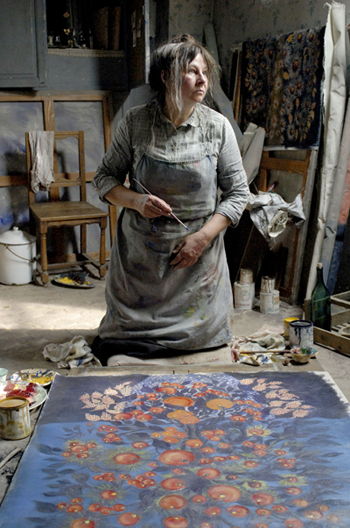|
Reviews of Recent Independent, Foreign, & Documentary Films in Theaters and DVD/Home Video
SÉRAPHINE
In a quiet, rural village in northern France in 1913, domestic housekeeper Séraphine Louis (Yolande Moreau) could not seem further removed from her new employers, two cultured Germans, a brother Wilhelm Uhde (Ulrich Tukur) and sister Anne Marie (Anne Bennent). Wilhelm, an art collector, is preparing an article on his friend Picasso. But the virtually silent Séraphine has a secret life, and the gradual revelation of the painstaking purpose of her maddeningly mysterious behavior is startling. She stares fixedly in a meadow, gathers river mud and wildflowers, collects candle drippings at church, curtly demands specific supplies at the stationers, and meticulously mixes ingredients with a pestle and mortar. Behind the locked doors of her apartment each night, she sings hymns to the voices of saints in her head, and pours out her emotions into painting wildly vibrant flora on small wooden panels. The next morning, she is back at the drudge work she has done for 30 years. Uhde’s discovery and encouragement of her paintings set off a concatenation that radically changes her life, and the film becomes a more straightforward, tragic biography. Writer/director Martin Provost is sympathetic but honest about Uhde’s complicated relationship with Séraphine. She cannot understand that her patron too has a precarious position in society. He is a German in France when war breaks out, and he is also a homosexual (he’s briefly seen with an anarchist artist), an aesthete, a collector of “degenerate” modern art, as well as a champion of Henri Rousseau, who he is reminded of in Séraphine’s work. There is a brief giddy period between the wars when Uhde can afford to subsidize Séraphine of Senlis, as she came to be known. She is suddenly free to buy larger canvases and more supplies. But the income and recognition also trigger a break in her repressed routine, like a spring suddenly released with no boundaries. A small town can sometimes embrace eccentricity, but here they became more intolerant of her increasingly disruptive behavior, even as her work was being included in a Paris exhibition of “The Modern Primitives.” Would she nowadays be considered
crazy? The Snake Pit-like conditions she endured at
a psychiatric hospital have been shown
as unfortunately typical in other period films, but would modern
psycho-pharmaceuticals have helped or dulled her inspiration? Moreau
evokes intense sympathy for Séraphine. She quirkily combined comedy and
poignancy in 2004’s When the Sea Rises, her satirical take on
life vs. art that drew on her own theatrical experiences, but she goes
deep inside this story to interpret another’s life. While
Séraphine should be a must for
anyone interested in art and women’s history,
Moreau’s brilliant performance, the lusciousness of
Laurent Brunet’s cinematography, and
Michael Galasso’s lovely score will
move more to be intrigued by Séraphine’s
colorful wild flowers. Nora Lee Mandel
|


